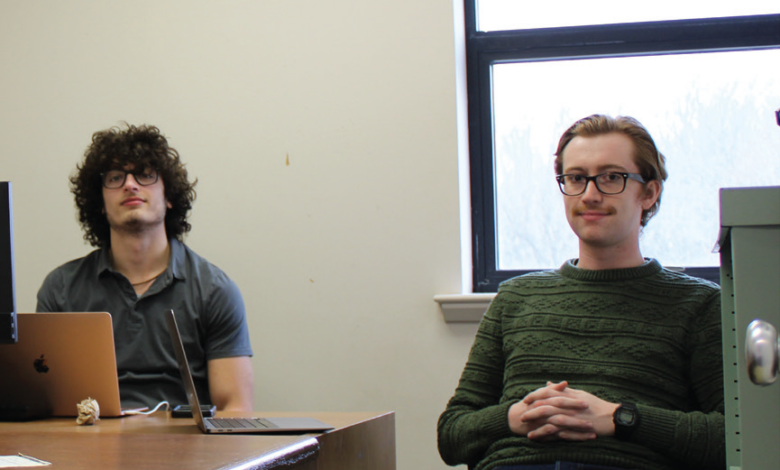
Brogan, students help fight food insecurity
By Jake Tiger
WITH frantic authority, professor Michael Brogan flung his classroom door open at 2:44 p.m. on March 23, holding a box of assorted, snack-sized bags of chips.
Brogan began lofting chips across the classroom to his students, who happily received them without batting an eye, before he himself tore into a bag of Cool Ranch Doritos, and started instructing his class — a typical Thursday afternoon for POL 205, Introduction to Public Policy.
Brogan always brings snacks on Thursdays when his students make calls for the Trenton Health Team, following up with residents of Mercer County who participated in surveys regarding the area’s food insecurity resources.
“We’re calling these people who have food insecurities, who applied for the survey,” said junior political science major Ranai Morgan. “It’s definitely rewarding because you want to make sure that these people are getting the stuff that they need.”
Brogan and his classes have been working with the Trenton Health Team for about a year, making hundreds of calls every Thursday to combat food insecurity in the region and get real-world experience in the field of public policy.
In the past, Brogan’s classes have also worked with the Delaware Riverkeeper Network, making similar survey calls.
“I think the big skill it gives them is just being able to manage a pretty complex project,” said Brogan. “They’re working as teams, giving numbers, making calls, reading the script, and then of course, updating the database.”
At the start of class, Brogan assigned each of his five groups of students about 40 phone numbers to call out of around 500 total.
The groups then broke off into their designated offices to enter the numbers and make calls, most of which unfortunately went unanswered as usual, spending a majority of the period listening to dial tones, and if they were lucky, an answering machine.
“Unfortunately, most of the respondents don’t actually participate in the survey or don’t answer,” said sophomore political science major Carmen Scialla. “Sometimes you’ll get people, and most of them usually aren’t interested.”
According to Scialla, of the hundreds of numbers called, the class had only reached nine people who planned to follow through with the survey.
“It’s kind of sad that the numbers are low,” said junior political science major Naa’san Carr. “I wish more people would answer the phone, because we have resources out there for them. … You change the world one person at a time.”
While students oscillated in their office chairs and listened to the phone ring, Brogan ran back and forth between the second floor of the Fine Arts building and the third floor of Sweigart Hall, the two locations where his students made calls in empty adjunct offices.
“It gets a little crazy walking around the buildings,” said Brogan. “We used to have a phone-a-thon room … in the Canastra Center, but I think they redid that for faculty offices, so they got rid of it.”
The session on March 23 marked the final time the class made calls for the Trenton Health Team, finally finishing the laundry list of phone numbers. Of course, Brogan saw fit to celebrate the occasion the only way he knew how.
“Next week, I’ll bring donuts,” said Brogan. “You can tell them that and hold me accountable.”
For Rider students struggling with food insecurity, the campus’ food and resource pantry provides food, clothing and other essentials to those in need, and can be found in room 23 of the Joseph P. Vona Center, beside Daly’s Dining Hall. Operating hours and more information can be found on Rider’s website under the Office of Service and Civic Engagement Resources tab.


